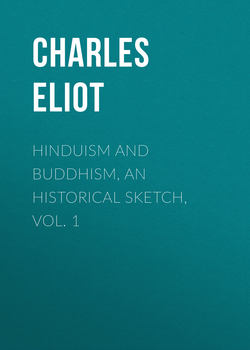Читать книгу Hinduism and Buddhism, An Historical Sketch, Vol. 1 - Charles Eliot - Страница 13
BOOK I
INTRODUCTION
13
ОглавлениеIndian ideas about the destiny of the soul are connected with equally important views about its nature. I will not presume to say what is the definition of the soul in European philosophy but in the language of popular religion it undoubtedly means that which remains when a body is arbitrarily abstracted from a human personality, without enquiring how much of that personality is thinkable without a material substratum. This popular soul includes mind, perception and desire and often no attempt is made to distinguish it from them. But in India it is so distinguished. The soul (âtman or purusha) uses the mind and senses: they are its instruments rather than parts of it. Sight, for instance, serves as the spectacles of the soul, and the other senses and even the mind (manas) which is an intellectual organ are also instruments. If we talk of a soul passing from death to another birth, this according to most Hindus is a soul accompanied by its baggage of mind and senses, a subtle body indeed, but still gaseous not spiritual. But what is the soul by itself? When an English poet sings of death that it is "Only the sleep eternal in an eternal night" or a Greek poet calls it [Greek: atermona nêgreton hupnon we feel that they are denying immortality. But Indian divines maintain that deep sleep is one of the states in which the soul approaches nearest to God: that it is a state of bliss, and is unconscious not because consciousness is suspended but because no objects are presented to it. Even higher than dreamless sleep is another condition known simply as the fourth state51, the others being waking, dream-sleep and dreamless sleep. In this fourth state thought is one with the object of thought and, knowledge being perfect, there exists no contrast between knowledge and ignorance. All this sounds strange to modern Europe. We are apt to say that dreamless sleep is simply unconsciousness52 and that the so-called fourth state is imaginary or unmeaning. But to follow even popular speculation in India it is necessary to grasp this truth, or assumption, that when discursive thought ceases, when the mind and the senses are no longer active, the result is not unconsciousness equivalent to non-existence but the highest and purest state of the soul, in which, rising above thought and feeling, it enjoys the untrammelled bliss of its own nature53.
If these views sound mysterious and fanciful, I would ask those Europeans who believe in the immortality of the soul what, in their opinion, survives death. The brain, the nerves and the sense organs obviously decay: the soul, you may say, is not a product of them, but when they are destroyed or even injured, perceptive and intellectual processes are inhibited and apparently rendered impossible. Must not that which lives for ever be, as the Hindus think, independent of thought and of sense-impressions?
I have observed in my reading that European philosophers are more ready to talk about soul and spirit than to define them54 and the same is true of Indian philosophers. The word most commonly rendered by soul is âtman55 but no one definition can be given for it, for some hold that the soul is identical with the Universal Spirit, others that it is merely of the same nature, still others that there are innumerable souls uncreate and eternal, while the Buddhists deny the existence of a soul in toto. But most Hindus who believe in the existence of an âtman or soul agree in thinking that it is the real self and essence of all human beings (or for that matter of other beings): that it is eternal a parte ante and a parte post: that it is not subject to variation but passes unchanged from one birth to another: that youth and age, joy and sorrow, and all the accidents of human life are affections, not so much of the soul as of the envelopes and limitations which surround it during its pilgrimage: that the soul, if it can be released and disengaged from these envelopes, is in itself knowledge and bliss, knowledge meaning the immediate and intuitive knowledge of God. A proper comprehension of this point of view will make us chary of labelling Indian thought as pessimistic on the ground that it promises the soul something which we are inclined to call unconsciousness.
In studying oriental religions sympathy and a desire to agree if possible are the first requisites. For instance, he who says of a certain ideal "this means annihilation and I do not like it" is on the wrong way. The right way is to ascertain what many of our most intelligent brothers mean by the cessation of mental activity and why it is for them an ideal.
51
Turîya or caturtha.
52
Indians were well aware even in early times that such a state might be regarded as equivalent to annihilation. Br. Ar. Up. II. 4. 13; Chând. Up. VIII. ii. 1.
53
The idea is not wholly strange to European philosophy. See the passage from the Phaedo quoted by Sir Alfred Lyall. "Thought is best when the mind is gathered into herself and none of these things trouble her—neither sounds nor sights nor pain nor any pleasure—when she has as little as possible to do with the body and has no bodily sense or feeling, but is aspiring after being."
54
Mr Bradley (Appearance and Reality, p. 498) says "Spirit is a unity of the manifold in which the externality of the manifold has utterly ceased." This seems to me one of the cases in which Mr Bradley's thought shows an interesting affinity to Indian thought.
55
But also sometimes purusha.
